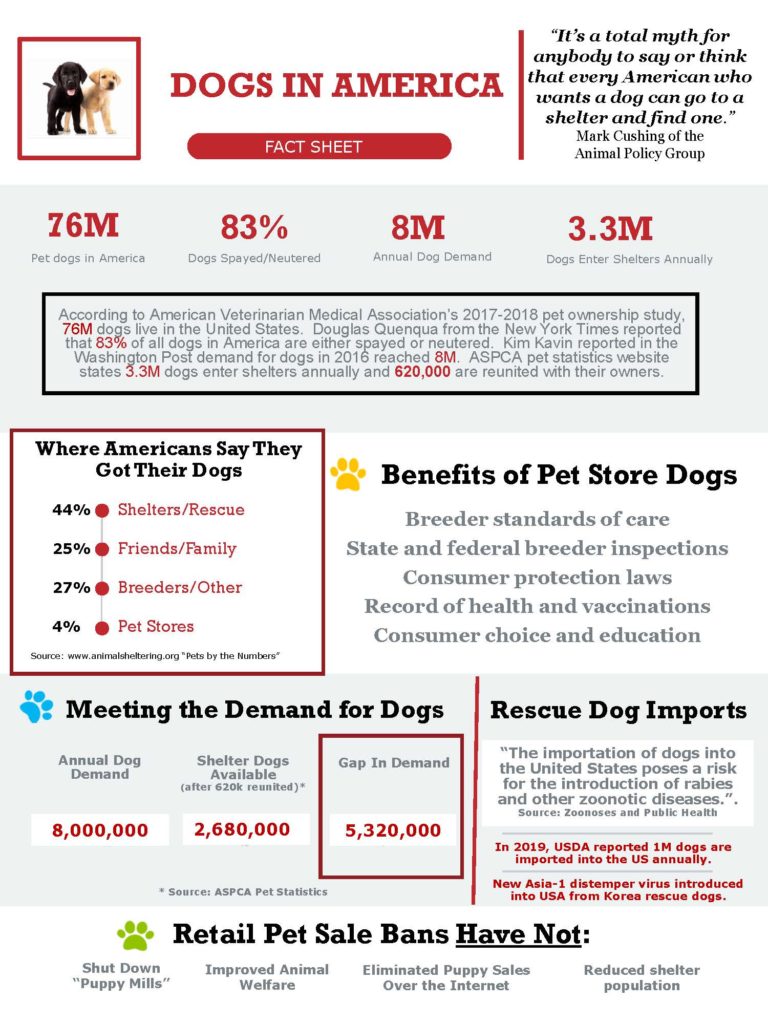How Can We Help?
What is Best for Pets?
What is Driving the Emotionally Charged Demands to Ban the Sales of Regulated Pets From Pet Stores?
Is it a desire to improve animal welfare or is it to appease special interest groups? It can’t be both.
-Joe Watson, President and CEO of Petland Inc.
Across America today, approximately 300-communities and 3-states have banned the sales of regulated pets at pet stores. Activists testify bans are needed to improve animal welfare. They claim banning retail sales of regulated pets will reduce demand for these pets which will trickle down and eliminate substandard breeders known as “mills.” This proposition has been proven false.
Who is driving this ban on regulated pet sales? Oftentimes, regulated pet sale ban activity is driven by supporters of local non-regulated pet dealers (mostly rescues) who compete with pet stores. These local special interest groups have the support of the Washington DC-based (tax-exempt) Humane Society of the United States.
WHO IS THE HUMANE SOCIETY?”
It would be easy to assume the Humane Society of the United States (HSUS) operates local humane societies but in reality HSUS doesn’t operate a single pet shelter. HSUS is “humane” only in name. HSUS lacks credibility in the animal world as illustrated by their part in the reported $15.75 million payment to Feld Entertainment (Ringling Bros. Circus) to settle a Racketeer Influenced and Corruption (RICO) Act case. It would take over 69,000 individual donors sending $19-a-month to cover that settlement.
Interestingly, HSUS publicly criticizes the United States Department of Agriculture (USDA) regulated pet breeders who sell to pet stores. USDA is the same federal agency that certifies our meat, dairy and school lunches as safe. Yet, HSUS claims USDA lacks the ability to ensure pet breeders provide humane care. Based on federal law, USDA licensed breeders are the only breeders in America that are subject to federal standards of care. By advocating for the ban on regulated pet sales, HSUS is lobbying for the elimination of federally regulated sources of pets.
HAVE EXISTING PET SALE BANS IMPROVED ANIMAL WELFARE?
While HSUS publicly claims to support animal welfare, there’s no evidence pet sale bans have eliminated a single “puppy mill” or improved animal welfare. The exact opposite is true. Bans are pushing families to buy their pets over the internet or in the dark corners of the unregulated pet trade. A space out of sight and out of mind of elected officials and federal oversight. A space that lacks transparency, animal welfare standards, consumer protection and consumer choice. This is what HSUS is promoting. This does not promote animal welfare.
So, if banning the sale of pets for the purpose of improving animal welfare isn’t producing the desired results, why is HSUS continuing to push regulated pet sale bans? Further, why would a local or state governmental body support a bill that eliminates regulatory oversight and animal welfare safeguards? It seems like an oxymoron to say the “Humane Society” is leading a public policy initiative that fails to improve animal welfare. But that is exactly what HSUS is promoting.
WHY DOES HSUS WANT TO ELIMINATE PETS FROM REGULATED AND INSPECTED SOURCES?
To answer why HSUS would do this, just follow the money. This issue has nothing to do with improving animal welfare. Even the CEO of HSUS hasn’t been able to effectively explain how eliminating regulated and inspected sources of pets promotes animal welfare standards of care.

In reality, the tax exempt HSUS is a fundraising machine that pulls in millions of donor dollars attacking regulated (tax paying) pet stores. It’s easy to target brick and mortar businesses so it’s not surprising pet stores are their favorite target. Yet, pet stores find homes for less than 4% of all dogs obtained in America each year. Again, this debate is not about animal welfare. HSUS attacks pet stores because it’s a primary driver for fundraising. You simply have to follow the money.
DO PET SALE BANS REDUCE BAD BREEDERS AND INCREASE SHELTER ADOPTIONS?
HSUS and local special interest groups claim that passing retail pet sale bans eliminate USDA regulated breeders but after 300+ sales bans, the number of USDA breeders is not dropping. In fact, the number of USDA breeders that HSUS demonizes is increasing.
The myth of pet overpopulation in America has been widely refuted. While there once was a pet overpopulation problem in America, the success of animal welfare efforts to promote spay/neuter programs has resulted in more than 80% of all dogs today being spayed or neutered. This has created a pet shortage to the point where local dog shelters and rescues have begun importing dogs from out-of-state and even international imports. According to a recent federal government report, over 1M dogs are being imported into the United States each year to meet demand. However, shelters and rescue pets are not the best answer for every American family.
REGULATED PET SALE BANS DO NOT PROMOTE ANIMAL WELFARE STANDARDS.
Pet ownership is very emotional and often polarizing. But the conversation must start with answering the question “Does eliminating the only regulated source of pets improve animal welfare?” Clearly it doesn’t. It does the exact opposite. Just like with Prohibition from the 1920s, the unregulated pet trade will find a way to meet American’s strong demand for pets. This new underground pet industry has unintended consequences of increased cases of rabies, parasites and aggressive dog attacks on children and the elderly.
Suggested further reading: Unintended Consequences of California’s Retail Pet Sale Ban
REGULATIONS PROVIDE THE BEST PROTECTIONS
Regulated sources of pets ensure stronger animal welfare standards, greater transparency for regulators and consumers and it ensures state consumer protection for pet owners. While the loud crowd of special interest activists demand bans, their proposal fails to improve animal welfare. Pets are part of our families. They deserve the protection of regulatory oversight, greater transparency and humane standards of care. Please do what is best for pets and the families that love them.
